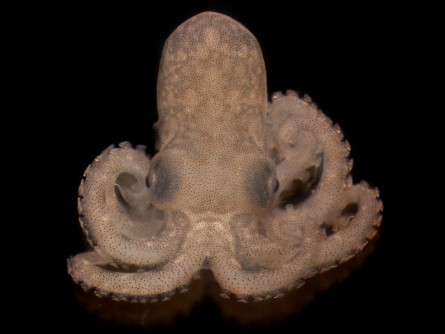Climate change is causing an increase in the number of octopuses, but the warmer ocean temperatures could also harm their vision and put their survival at risk, according to a recent study by researchers from the University of Adelaide, University of South Australia, University of California Davis, and the South Australian Research and Development Institute.
Dr. Qiaz Hua, a recent PhD graduate from the University of Adelaide’s School of Biological Sciences, and her team exposed octopus embryos to different temperature treatments: a control temperature of 19°C, a current summer temperature of 22°C, and a projected summer temperature of 25°C based on the Intergovernmental Panel on Climate Change’s predicted 3°C increase by 2100.
The researchers found that the levels of two crucial proteins for vision were significantly reduced under the projected ocean warming conditions. One of these proteins is a structural protein found in high amounts in animal eye lenses, which helps maintain lens transparency and optical clarity. The other protein is responsible for regenerating visual pigments in the eyes’ photoreceptors.
“We found several proteins important for vision that were affected by thermal stress,” says Dr. Hua. “The levels of both of these proteins were significantly reduced under projected ocean warming conditions, which suggests that octopus vision is likely to be impaired under thermal stress.”
Octopuses rely heavily on their vision, with 70% of their brain dedicated to visual processing, which is 20% more than in humans. Their vision is essential for detecting predators and prey, as well as for communication. Impaired vision could significantly impact an octopus’s chances of survival in the wild.
In addition to the potential vision problems, the study also found that higher ocean temperatures could negatively affect octopus broods. In two out of three replicate octopus broods exposed to the projected future temperature, none of the eggs hatched, and in the third brood, less than half of the eggs hatched. The mothers of the broods where no eggs hatched died naturally while the eggs were still in early development stages.
“Because maternal care of embryos occurs in octopuses, global warming could have a simultaneous impact on multiple generations, with the low survival rate of the embryos caused by the direct effect of thermal stress as well as the indirect effect of thermal stress on the mothers,” explains Dr. Hua. “Our study shows that even for a highly adaptable taxon like octopuses, they may not be able to survive future ocean changes.”
Other effects of higher temperatures observed in octopuses include a higher metabolic rate, reduced size at maturity, and even a range shift in the distribution of some species.
The researchers hope that future studies will examine a combination of environmental stressors, including ocean acidification, warming, and deoxygenation. They also suggest conducting transgenerational experiments to determine if sensitivity or tolerance to environmental stressors is passed down from one generation to the next, which could help understand the long-term impacts on the species.
As climate change continues to affect our oceans, it is crucial to understand how different species, even those as adaptable as octopuses, may be impacted. This study highlights the potential risks to octopus vision and survival under projected ocean warming conditions, underlining the importance of addressing climate change to protect marine life.


